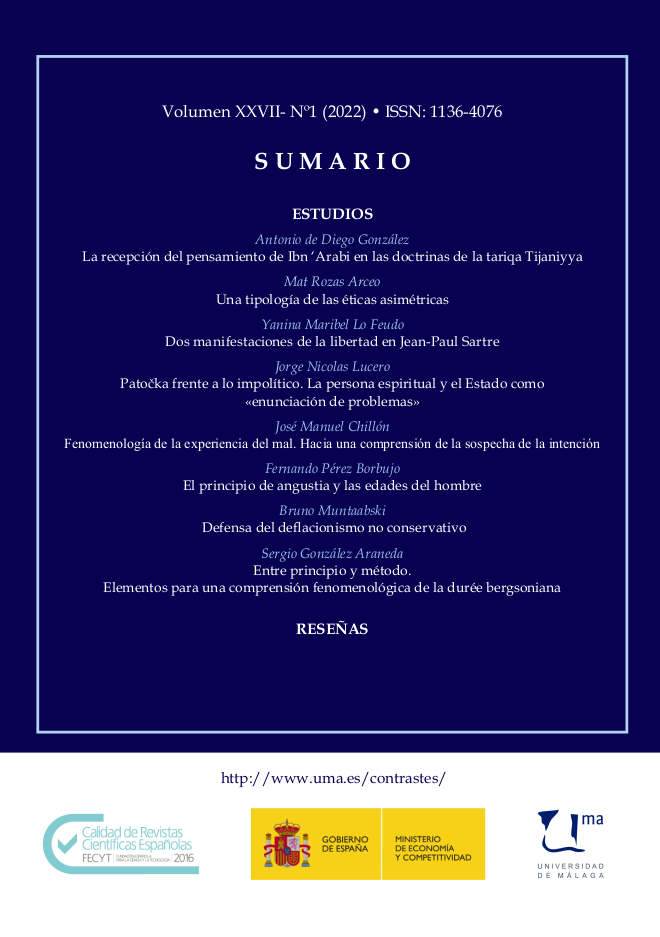Pato?ka Facing the Impolitical
The Spiritual Person and The State as “Problems Enunciation"
DOI:
https://doi.org/10.24310/Contrastescontrastes.v27i1.11234Keywords:
community, impolitical, negativity, Pato?ka, spiritual personAbstract
This work analyses the political questions in Jan Pato?ka’s thinking through the perspective of the impolitical, specially by following the theorization that Roberto Esposito gives on this approach. Firstly, the work studies the figure of spiritual person as agent and defender of a “non-political politics”, who tackles the problematicity of sense committed with community and beyond any mystical-religious interpretation. Secondly, it exposes an affinity between Pato?kian concepts of negative Platonism, war, and solidarity of the shaken, with the leitmotiv of the impolitical. The work concludes defending an “impolitical” sense of the State in Pato?ka’s work from his reading on the foundation of the First Czechoslovak Republic.
Downloads
Metrics
Publication Facts
Reviewer profiles N/A
Author statements
Indexed in
-
—
- Academic society
- N/A
- Publisher
- Universidad de Málaga
References
Benda, J. 1933: Discours à la nation européenne, París: Gallimard.
Cacciari, M. 1994: “Lo impolítico nietzscheano”, en: Desde Nietzsche. Arte, tiempo y política, trad. M. B. Cragnolini y A. Paternostro, Buenos Aires: Biblos, pp. 61-79.
C?r?u?, T. 2016: “Pato?ka’s Radical Agonistic Politics”, en Meacham, D. y Tava, F. (eds.). (2016). Thinking after Europe: Pato?ka and Politics, Londres: Rowman and Littlefield, pp. 237-258.
Esposito, R. 1996a: “Introduzione. Termini della politica”, en Oltre la politica. Antologia del pensiero “impolitico”, Milán: Bruno Mondadori.
---. 1996b: “Presentazione di J. Pato?ka. L’uomo spirituale e l’intellettuale”, en Micromega, 1996, n° 2, pp. 166-170.
---. 2006: Categorías de lo impolítico, Buenos Aires: Katz.
---. 2012: Diez pensamientos acerca de la política, México: F. C. E.
---. 2014: “Prefazione”, en Croce. C. L’ombra di pólemos, il reflessi di bios. La prospettiva della cura a partire da Jan Pato?ka e Michel Foucault, Milán: Mimesis, pp. 13-17.
Girardi, L. 2020: “From Care for the Soul to the Theory of the State in Jan Pato?ka”, en International Journal of Philosophy and Theology, 81:3, pp. 196-210.
Havelka, M. 1998: “Nepolitická politika: kontexty a tradice”, Sociologický ?asopis, 1998, Vol. 34, No. 4, pp. 455-466.
Hervás, A. G. 2006: “Ontología de la sociedad civil”. Daimon Revista Internacional De Filosofía, (39), 133-150. Recuperado a partir de https://revistas.um.es/daimon/article/view/20841.
Homolka, J. 2017: “Jan Pato?ka’s non-political politics”, Interpretationes: Studia Philosophica Europeanea, vol 7, nro 1, pp. 130-146.
Hrabal, B. 1975: “Rozhovor s Bohumilem Hrabalem”, En Tvorba. Týdeník pro politiku, v?du a kulturu, 8 de enero, p. XIII.
Jünger, E. 1995: Sobre el dolor, seguido de La movilización total y Fuego y movimiento, trad. A. Sánchez Pascual, Madrid: Tusquets.
Leufer, D. 2016: “The Dark Night of the Soul: Politics and Despair in Jan Pato?ka’s Sixth Heretical Essay”, en Meacham, D. y Tava, F. (eds.). (2016). Thinking after Europe: Pato?ka and Politics, Londres: Rowman and Littlefield, pp. 161-182.
Manton, E. 2007: “The Political Philosophy of a Non-Political Philosopher”, en Pato?ka, J. Living in Problematicity, trad. al inglés por E. Manton, Praga: Oikoymehn, pp. 70-80.
Masaryk, T. 1936: Sv?tová revoluce za války a ve válce 1914-1918, Praga: ?in a Orbis.
Meacham, D. y Tava, F. (eds.). (2016). Thinking after Europe: Pato?ka and Politics, Londres: Rowman and Littlefield.
Mouffe, Ch. 2011: En torno a lo político, trad. S. Laclau, México: F. C. E.
Pato?ka, J. 1970: Il senso dell'oggi in Cecoslovacchia, trad. G. Pacini, Milán: Lampugnani Nigri.
---. 1976: Los intelectuales ante la nueva sociedad, trad. F. de Valenzuela, Madrid: Akal.
---. 1996: Pe?e o duši I, Sebrané spisy vol. 1, Praga: Oikoymenh.
---. 1999: Pe?e o duši II, Sebrané spisy vol. 2, Praga: Oikoymenh.
---. 2002: Pe?e o duši III, Sebrané spisy vol. 3, Praga: Oikoymenh.
---. 2004: El movimiento de la existencia humana, Madrid: Encuentro.
---. 2006a: ?eši I, Sebrané spisy vol. 12, Praga: Oikoymenh.
---. 2006b: ?eši II, Sebrané spisy vol. 13, Praga: Oikoymenh.
---. 2007a: Libertad y sacrificio, trad. I. Ortega Rodríguez, Salamanca: Sígueme.
---. 2007b: Dv? machovské studie, Praga: Oikoymenh.
---. 2016: Ensayos heréticos sobre la filosofía de la historia, trad. I. Ortega Rodriguez, Madrid: Encuentro.
---. 2019a: “Lecciones XVII-XX: cuerpo, comunidad, mundo, lenguaje”, Aporía, tercer número especial, pp. 18-47 (trad. I. Ortega Rodríguez).
---. 2019b: Lettrès à Robert Campbell et les siens, Grenoble: Jerôme Millon.
Pinc, Z. 2010: Být ovádem obce, Praga: FHS UK.
Stanciu, O. 2019: “El mito como apertura al mundo. Sobre un equívoco en el pensamiento de Pato?ka”, en Aporía, nro.3 Especial, pp. 112-128., revista on-line: https://doi.org/10.7764/aporia.3-Especial.1939
Saidel, M. 2013: “Political and Impolitical: Two Perspectives to Rethink the Common and the Political in Contemporary Thought”, Las Torres de Lucca, No 3 (julio-diciembre 2013): 7-34.
Šotola, J. 1975: “Prohlášení J. Šotoly”, en Tvorba. Týdeník pro politiku, v?du a kulturu, 2 de abril, p. 7.
Tava, F. 2016: The Risk of Freedom: Ethics, Phenomenology and Politics in Jan Pato?ka, London: Rowan and Littlefield.
U?ník, ?. 2017: “Neoliberalism and Jan Pato?ka on supercivilization and education”, Phainomena XXVI/102-103, pp. 153-175.
Downloads
Published
How to Cite
Issue
Section
License
This journal provides immediate free access to its content under the principle of making research freely available to the public. All content published in Contrastes. Revista Internacional de Filosofía, are subject to the Creative Commons Attribution-NonCommercial-ShareAlike 4.0 license whose full text can be found at <http://creativecommons.org/licenses/by-nc-sa/4.0>
It is the responsibility of the authors to obtain the necessary permissions of the images that are subject to copyright.
Authors whose contributions are accepted for publication in this journal will retain the non-exclusive right to use their contributions for academic, research and educational purposes, including self-archiving or repository in open access repositories of any kind.
The electronic edition of this magazine is edited by the Editorial Service of the University of Malaga (Uma Editorial), being necessary to cite the origin in any partial or total reproduction.










5.png)
